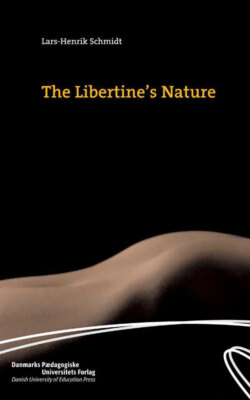The Libertine's Nature

Реклама. ООО «ЛитРес», ИНН: 7719571260.
Оглавление
Lars-Henrik Schmidt. The Libertine's Nature
Foreword
Prelude: Sade and I. Sade Once Again
The Thesis
Reading
The Way It Goes
Le Philosophe
First Fiddle
Ethics
Sade’s Craving
Please, Please Me
Chapter 1: Natural Excess. Redundancy
The Climatic Circumstances
Sade and Kierkegaard
The Erotic Triangle
Chapter 2: Disorderly Order. The Real
Natural Taste
The Taste for Criminality
The Dilemma: From the Perspectives of Politics and Philosophy
The Dilemma: From the Perspective of Aesthetics
Chapter 3: Narrated Sensuality. Sade’s Sensuality
The Anus as Temple: Sodomy
The Orgy
Taste for Pleasure
Chapter 4: Painful Pleasure
The Criminal Appropriation
The Primacy of the Circumstances
In Comparison
Going for the Sure Thing
Chapter 5: A Theory of Pleasure. The Crossroads
The Matters of Course
The Libertine’s Preferences
One’s Pleasure is the Other’s Pleasure
Loneliness-Commoneness
Chapter 6: The Forbidden Fruits. The Criminal Imagination
Der Mensch is(s)t nicht was er ist
A Characteristic Example from our Time
The Prohibitions
Craving, Desire, Need
To Digest or Not to Digest
Nothing Common is Foreign to Me
Chapter 7: The Blood Bond. The Most Ordinary Passion
A Libertine Remorse
Chapter 8: The Administration of Life
Chapter 9: The Craving of the Flesh
Chapter 10: The Libertine of Death
Postlude: Me and Sade
Noter
Отрывок из книги
Lars-Henrik Schmidt
The Libertine’s Nature
.....
That moral philosophy always lets the other play first fiddle can be illustrated with reference to the modern versions of moral law. As in so many other cases, it is Rousseau who epitomizes regard for the other. In La Nouvelle Heloïse Rousseau-Wolmar says that there is only one moral commandment (précepte) that can replace all of the others: “Do nothing, say nothing that you do not wish everyone to see or hear.” In Rousseau we find a brilliant and radical thesis on a presence/absence equivalence: on the generalized other’s presence insofar as this entity is concretely absent and on its absence in case it is concretely present. The ideal for this neutralization between absence and presence in an absolute being there is borrowed from a certain Roman who wished his house to be constructed in a way that allowed one to see everything that happened inside it. One is in a condition of being seen by a third party. In Rousseau, relations and relations to oneself are always mediated through ‘the other’ (which is thus really in the nature of ‘a third party’). It is immediacy lost or lost self-presence. It is the generalized other, the third party’s being there that decides the moral worth.
It is the same idea that makes Rousseau describe the individuality of modern existence as the mundane attitude of seeing oneself through the others’ eyes. One’s relation to oneself is always mediated through the relation to the generalized other. In Rousseau what we have is a thoroughly worldly notion of transparency; but this moral claim to public transparency is linked to Christianity in Kant, who often systematizes Rousseau, and not always for the best.
.....